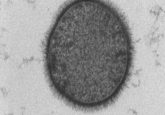The nasal microbiome: determining the severity of your cold?

The composition of the nasal microbiome could impact the extent of symptoms experienced by people suffering from a cold.

Recent research conducted at the University of Virginia (VA, USA) and lead by Rob Turner, which set out to establish the impact the nasal microbiome may have on colds, has come to a conclusion. The study uncovered a correlation between combinations of bacteria making up the nasal microbiome and the severity and type of symptoms experienced by an infected individual.
The research team examined the nasal microbiomes of 152 participants to identify the type and prevalence of different bacteria in each subject. The microbiomes were examined before and after a cold was induced in the participants to ensure that the presence of the cold virus did not alter the composition of the microbiome.
The study found that there were six disparate categories of composition in the subjects’ nasal microbiomes. Each of these categories was associated with a distinct profile of symptom type and severity. “There were effects on virus load and how much virus you shed in your nasal secretions. So the background microbiome, the background bacterial pattern in your nose, had influences on the way that you reacted to the virus and how sick you got,” reported Turner.
The study was unable to identify a causal link; the correlation could be due to the same genetic predisposition to a certain microbiome composition resulting in a specific reaction to the cold virus or any number of environmental factors. Turner, however, believes that the association could be impacted by both environmental and microbial factors, declaring that, “I suspect there is some interaction among the host and the environment and the pathogen that determines what you end up with.”
After discovering this association the team was encouraged to examine the effects probiotics may have on cold symptoms. Each participant was given a probiotic to drink, and the effect on the microbiome in their nose and in their gut was monitored.
The results, however, were negative, finding that the probiotic made little impact on the gut microbiome and none on the nasal. The potential for a direct administration of probiotics to the nose via a spray was considered, but Turner was doubtful of its likely impact.
There is scope for further research, both to establish if the correlation is due to a causal link from the microbiome and to establish if there are more effective ways to alter the nasal microbiome and to study the impact on cold symptoms.
“One of the things that would be interesting to ask, and this would be a completely different study, is, what happens if you give antibiotics? Can you change the nasal flora by giving antibiotic? And is that a good thing or is that a bad thing? Those are all unknowns,” pontificated Turner.





